“I can’t have a baby because I have a twelve-thirty lunch meeting.”—— Diane Keaton as J.C. Wiatt
Hardly an old “classic movie,” and, probably, not likely to become one, however long the future, but Baby Boom, despite its clichéd plot, is practically carried, single-handed, by the effervescent, ever-eccentric Diane Keaton. She almost always manages a commanding presence in her films, even when her supporting players, and sometimes the movies themselves, give less than she does.
Best remembered, so far, for her roles in the Godfather films and the eight directed by Woody Allen, the approaching-seventy actress, a free spirit on screen and in life—she had relationships with both Allen and Warren Beatty, starring in the latter’s Reds—has made a trademark of wearing white, suits, ties and hats. Ever seen her on talk shows? Well, you know. Her eccentricities, her flamboyant body language, outspoken comments and, yes, that perpetual sparkle, make her the Katharine Hepburn of today. (Well, maybe Hepburn didn’t always “sparkle” off screen.)
Diane Keaton is definitely, dramatically a modern lady. That is, if one is familiar with her films, most of which are set in the present, it seems absurd to imagine her in, say, an historical drama. One of the few period pictures she made, also directed by Allen, is Love and Death, about a scheme to assassinate Napoleon; it is totally successful, perhaps because it is a comedy, with history treated as a farce, as it often becomes in the distortions of many a history book.
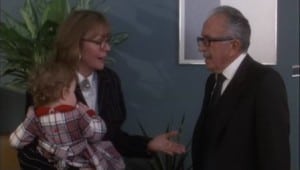 Keaton, then, is clearly herself in Baby Boom, contemporary and practical and larger-than-life. She owns the property, so to speak. And this screen adventure is worthy of her style and persona only because she makes the most of—even surmounts—the somewhat limited range of the material. The movie is an advanced take on the Doris Day films of the ’60s in which, most of the time, that actress is quite content to be a housewife. Sans the virginal schoolgirl grin and the antiseptic touches upon sexuality, Day’s That Touch of Mink comes the closest to Baby Boom in its imperfect sophistication.
Keaton, then, is clearly herself in Baby Boom, contemporary and practical and larger-than-life. She owns the property, so to speak. And this screen adventure is worthy of her style and persona only because she makes the most of—even surmounts—the somewhat limited range of the material. The movie is an advanced take on the Doris Day films of the ’60s in which, most of the time, that actress is quite content to be a housewife. Sans the virginal schoolgirl grin and the antiseptic touches upon sexuality, Day’s That Touch of Mink comes the closest to Baby Boom in its imperfect sophistication.
The place of the woman in the workplace of the 1980s, the theme which Baby Boom immediately and rather flagrantly establishes, complete with a documentary-style opening narration by journalist Linda Ellerbee, is subtly perpetuated in the remainder of the film by a quirk of the plot. Right off, her character loses it all, but at the end, in a plot about-face, she gets it all back, and more, possesses what the opening scenario set down as unobtainable for a woman—job and family.
J. C. Wiatt (Keaton), a high-wire business executive slated for a partnership with the boss, Fritz Curtis (Sam Wanamaker), of Sloane, Curtis and Company, is later denied an advanced position because becoming a “mother” has distracted her from her job. She’s “lost her focus,” as Curtis says. Not only that but an eager beaver (James Spader), craving that key to the executive washroom, is quick to take advantage of the situation and ease her out.
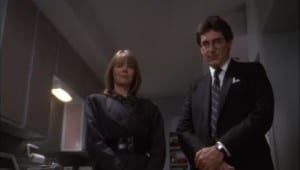 See, Wiatt is not really a “mom” in the biological sense—Keaton herself has never married—and this interruption in her job focus is the inheritance of a baby from a distant relative. Baby Elizabeth (alternately twins Kristina and Michelle Kennedy) is a cutie, as most babies are, and there is almost an immediate bond. Wiatt surrenders to the little one’s charms before she realizes it, lugging home a carload of essential baby things. Her live-in boyfriend (Harold Ramis), a specialist in five-minute copulations, wants no part of playing father, or, for that matter, helping to make a baby himself. This intrusion on his space was not part of their living arrangement.
See, Wiatt is not really a “mom” in the biological sense—Keaton herself has never married—and this interruption in her job focus is the inheritance of a baby from a distant relative. Baby Elizabeth (alternately twins Kristina and Michelle Kennedy) is a cutie, as most babies are, and there is almost an immediate bond. Wiatt surrenders to the little one’s charms before she realizes it, lugging home a carload of essential baby things. Her live-in boyfriend (Harold Ramis), a specialist in five-minute copulations, wants no part of playing father, or, for that matter, helping to make a baby himself. This intrusion on his space was not part of their living arrangement.
After his departure, in an effort to put her career back on course, J.C. interviews babysitters. She goes through a myriad collection of odd individuals. The first prospect, when asked, “What brought you to New York?,” replies, “The Lord.” “A-ha,” J.C. responds. “Well, er, thanks very much for coming by.” The final choice, perhaps no better, is a severe taskmistress (Carol Gillies), a German from Wiesbaden.
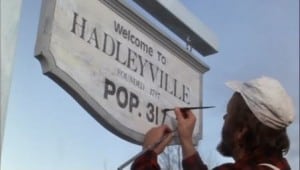 Too humiliated to face her co-workers when demoted to the Ferber Dog Chow account, J.C. quits. She wants a quieter life. Seclusion, perhaps. Out of a real estate brochure, she buys a 62-acre, two-story country house in Hadleyville, Vermont. As it will prove, the town is quaint and unsophisticated. Secluded, definitely. As she and Elizabeth arrive in her newly purchased, used station wagon, a clairvoyant sign painter is already adding two to the population figure. Now there are, in this place, 319 souls who don’t work at Sloane, Curtis and Company.
Too humiliated to face her co-workers when demoted to the Ferber Dog Chow account, J.C. quits. She wants a quieter life. Seclusion, perhaps. Out of a real estate brochure, she buys a 62-acre, two-story country house in Hadleyville, Vermont. As it will prove, the town is quaint and unsophisticated. Secluded, definitely. As she and Elizabeth arrive in her newly purchased, used station wagon, a clairvoyant sign painter is already adding two to the population figure. Now there are, in this place, 319 souls who don’t work at Sloane, Curtis and Company.
Rather soon, it seems that maybe she didn’t make the wisest move, after all. Winter arrives and she is hauling firewood through snowstorms. The roof falls in and the well dries up—and she is at the mercy of the only serviceman in town, ready with a succinct Vermontian “yep” or “nope.”
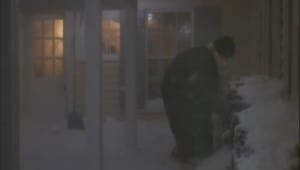 She passes out from exhaustion—maybe from frustration—and awakens on a physician’s table. When he suggests her problem might be caused by pregnancy, she says, “Fat chance! Less than zero chance.” His white coat suggests here is someone to whom she can confide, and she lays it all out, that the lack of what causes pregnancy is possibly her problem. “Sex? I can’t even say the word [she just did!], not that I was ever really into it. But when you don’t have any and there are no prospects—well, it’s very upsetting!”
She passes out from exhaustion—maybe from frustration—and awakens on a physician’s table. When he suggests her problem might be caused by pregnancy, she says, “Fat chance! Less than zero chance.” His white coat suggests here is someone to whom she can confide, and she lays it all out, that the lack of what causes pregnancy is possibly her problem. “Sex? I can’t even say the word [she just did!], not that I was ever really into it. But when you don’t have any and there are no prospects—well, it’s very upsetting!”
About that time there is a nearby whinny and a horse is escorted into the room. Dr. Jeff Cooper (Sam Shepard) is a veterinarian! J.C., to say the least, is aghast, frantic and, yes, hysterical. He had deceived her, she cries, wearing that white coat and the stethoscope (he isn’t actually wearing a stethoscope): she thought he was a real doctor. It is the beginning of a hate-love relationship. The hate, more likely the lingering embarrassment of revealing such intimate secrets to a vet, is clearly evident in their next encounter, in the public library when she spills an arm load of books and he helps her. She has come to the library to research making and marketing apple sauce.
Apple sauce?! Yes. J.C. made some for Elizabeth. She liked it, so mom fills a cupboard with jars of it. But why not sell it at the local stores? She labels her product Country Baby, and the road to a major business venture begins. Yuppie tourists—this is the ’80s, after all—go wild over the quaint product and buy it by the box and help make Country Baby a national sensation.
In the meantime, J.C.’s relations with Doctor Cooper take a decided turn for the better when he stops to help fix her flat tire and interrupts her ranting and raving long enough to give her a smack of a kiss. Afterward, limp against the side of the car, she can only say, “Wow!” Although she seems to regress to an impressionable, swooning teenager at the sight of him, the two advance to the next step, No. 4 from the Standard Comedy Plot Handbook. They hit it off at the local dance, accompanied by “Pennies from Heaven” and “Moonlight in Vermont.” The good doctor, vet or not, can dance and, naturally, has read that handbook, and, so, has a way with Elizabeth. J.C. looks admiringly at him, thinking, “Yes, yes, this is good.”
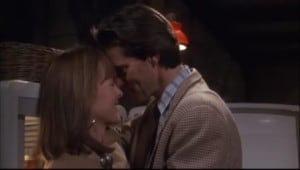 Fortunately for J.C., her “no prospects” status for sex improves that night back home. First, in a love scene against the open refrigerator, she tells him, which also reveals much about herself, “All men make me nervous—except you.” Next morning, while she giddily prepares breakfast, he comes downstairs barefooted, a little tired, perhaps, carrying his shoes and coat. “I usually require more than twenty minutes of sleep a day,” he says.
Fortunately for J.C., her “no prospects” status for sex improves that night back home. First, in a love scene against the open refrigerator, she tells him, which also reveals much about herself, “All men make me nervous—except you.” Next morning, while she giddily prepares breakfast, he comes downstairs barefooted, a little tired, perhaps, carrying his shoes and coat. “I usually require more than twenty minutes of sleep a day,” he says.
Moments later, many points having been made and stations of the plot passed, the phone rings. The climax is at hand. Her previous employer wants to buy out Country Baby. Returning to New York, she finds the executives of Sloane, Curtis and Company gathered around the big conference table. All smiles, with forced laughter and professing that any slight of the past is “water under the bridge,” they reveal themselves as hungry, sly wolves, salivating over a possible corporate takeover, presumably at J.C.’s expense.
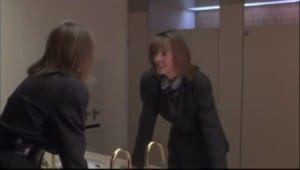 She is tempted. They give her time to consider. She retreats to the women’s washroom, exclaiming to herself in the mirror, “I’m back!” As she is returning to the den of wolves, her pace slows, and by the time she is before the pack again, she realizes she’s not the same woman, yuppie or not. No, no deal. She can market Country Baby just as well as they can. Hasn’t she already? Besides, she tells them, she likes her new freedom, likes being a mother, and, too, she’s met someone.
She is tempted. They give her time to consider. She retreats to the women’s washroom, exclaiming to herself in the mirror, “I’m back!” As she is returning to the den of wolves, her pace slows, and by the time she is before the pack again, she realizes she’s not the same woman, yuppie or not. No, no deal. She can market Country Baby just as well as they can. Hasn’t she already? Besides, she tells them, she likes her new freedom, likes being a mother, and, too, she’s met someone.
On a few occasions the comedy is rather forced, though not crucially, and one routine with an unmanageable Elizabeth in the midst of discussions about J.C.’s possible partnership becomes a bit ridiculous, a tired cliché. Beyond Keaton rising to all occasions, even this one, there are the competent supporting players who recall the golden days of the ’30s and ’40s when a host of familiar supporting faces was shared among the studios. Besides the stars already mentioned, there are Pat Hinge, Britt Leach, George Petrie, Paxton Whitehead and Victoria Jackson as an unsatisfactory babysitter who has a one-night stand with Wayne—“No, Dwayne,” her companion corrects.
The obsession in the ’80s of young yuppie mothers getting their infant darlings on the educational road ahead of the next child is still a craze today, unfortunately. J.C. takes Elizabeth to a park and overhears the mothers’ woes. “If you’re not on the waiting list, you can forget about it.” In another scene, a class of toddlers is subjected to flash cards, violin and computer lessons—all to aid, supposedly, in “multiplying intelligence.”
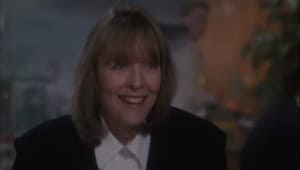 Some production veterans give this old teapot of a comedy a certain elegant polish. Meticulous cinematographer William Fraker had been Oscar-nominated for Looking for Mr. Goodbar and Heaven Can Wait (1978) and also—not to be forgotten—he photographed such diverse films as Bullitt and Rosemary’s Baby. He gives Baby Boom a stylish look, with vivid contrasts between the skyscrapers of New York and the autumn leaves of Vermont.
Some production veterans give this old teapot of a comedy a certain elegant polish. Meticulous cinematographer William Fraker had been Oscar-nominated for Looking for Mr. Goodbar and Heaven Can Wait (1978) and also—not to be forgotten—he photographed such diverse films as Bullitt and Rosemary’s Baby. He gives Baby Boom a stylish look, with vivid contrasts between the skyscrapers of New York and the autumn leaves of Vermont.
Nancy Meyers, who shares screenplay credit with Charles Shyer, has also advocated women’s rights in other films—Private Benjamin and Something’s Gotta Give, also starring Keaton. If Meyers writes, as already suggested, a bit effusively on behalf of her gender, she does so with understanding and honesty.
What seems a good idea for a movie is not always a good idea for a TV program. Some executives at NBC, or MGM/Universal, must have thought otherwise. With a carryover of some of the original cast—Wanamaker and the two Kennedy sisters; Meyers even wrote a few of the scripts—Baby Boom came to TV, with Kate Jackson as J.C. Wiatt. The series lasted only thirteen episodes, 1988-89, maybe because Wiatt had now become a lawyer, always a hard character to sell. That was probably not the problem. Sure, there could have been numerous causes for the failure of the series.
Clearly, one reason was that Baby Boom on TV didn’t have Diane Keaton.
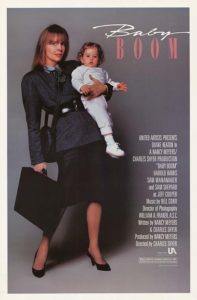
Good review, but I don’t think it’s accurate to say of Diane Keaton that “it seems absurd to imagine her in, say, an historical drama”. “Mrs. Soffel” (set in 1902), “Reds” (set circa 1912 – 1920) and “The Godfather Parts I & II” (set circa 1945 – 1959) were all historical dramas and she received excellent reviews for her work in all of them, convincingly playing women from different eras.
This movie is dated – how about those shoulder pads?! – but it’s still a fun ride. Diane Keaton always gives you your money’s worth, doesn’t she?